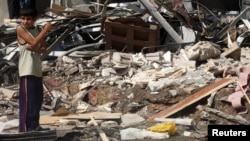WHITE HOUSE —
President Barack Obama said Friday he does not foresee sending U.S. ground troops into Syria. The president spoke at a joint news conference with Costa Rican President Laura Chinchilla in San Jose, Costa Rica.
When asked what he might do if more evidence of Syrian government chemical weapons use is produced, Obama said he has not ruled anything out, but sending ground troops is not likely.
“I do not foresee a scenario in which boots on the ground in Syria, American boots on the ground in Syria, would not only be good for America but also would be good for Syria,” said Obama.
The president said Middle Eastern leaders he has consulted agree.
Obama said if systematic use of chemical weapons in Syria is confirmed, the United States will take that information to the international community.
Meanwhile, he defended his administration’s response so far.
“We are not waiting. We are not standing by. We are currently the largest humanitarian donor to deal with the crisis in Syria. We are the largest contributor of non-lethal aid to the opposition. We have mobilized 80 countries to support the opposition,” said Obama.
Friday was the president’s second day of meetings with leaders in Latin America. As he did the day before with President Enrique Pena Nieto in Mexico, Obama talked with Chinchilla about the regional economy, security and immigration.
But as in Mexico, questions were asked about regional cooperation on fighting the drug trade and the accompanying violence, and especially about fighting the demand for drugs in the U.S.
Obama said Washington has done a great deal to combat the problem, and he pledged to do more.
“Much of the violence in the region is fueled by demand for illegal drugs, including in the United States. So we are going to keep on pursuing a comprehensive approach, not only through law enforcement, but also through education and prevention and treatment, that can reduce demand,” said Obama.
Both presidents emphasized the growing strength of the region’s economic ties. Obama said American trade with Costa Rica has doubled since the U.S. approved the Central American Free Trade Agreement with six countries in 2004.
The president said strengthened economies throughout the region would enable its countries to offer their people a better way of life and reduce the incentive for drug trafficking. And Obama said he would support immigration reform legislation that recognizes same-sex unions, but did not say whether he would sign a bill that does not.
When asked what he might do if more evidence of Syrian government chemical weapons use is produced, Obama said he has not ruled anything out, but sending ground troops is not likely.
“I do not foresee a scenario in which boots on the ground in Syria, American boots on the ground in Syria, would not only be good for America but also would be good for Syria,” said Obama.
The president said Middle Eastern leaders he has consulted agree.
Obama said if systematic use of chemical weapons in Syria is confirmed, the United States will take that information to the international community.
Meanwhile, he defended his administration’s response so far.
“We are not waiting. We are not standing by. We are currently the largest humanitarian donor to deal with the crisis in Syria. We are the largest contributor of non-lethal aid to the opposition. We have mobilized 80 countries to support the opposition,” said Obama.
Friday was the president’s second day of meetings with leaders in Latin America. As he did the day before with President Enrique Pena Nieto in Mexico, Obama talked with Chinchilla about the regional economy, security and immigration.
But as in Mexico, questions were asked about regional cooperation on fighting the drug trade and the accompanying violence, and especially about fighting the demand for drugs in the U.S.
Obama said Washington has done a great deal to combat the problem, and he pledged to do more.
“Much of the violence in the region is fueled by demand for illegal drugs, including in the United States. So we are going to keep on pursuing a comprehensive approach, not only through law enforcement, but also through education and prevention and treatment, that can reduce demand,” said Obama.
Both presidents emphasized the growing strength of the region’s economic ties. Obama said American trade with Costa Rica has doubled since the U.S. approved the Central American Free Trade Agreement with six countries in 2004.
The president said strengthened economies throughout the region would enable its countries to offer their people a better way of life and reduce the incentive for drug trafficking. And Obama said he would support immigration reform legislation that recognizes same-sex unions, but did not say whether he would sign a bill that does not.




